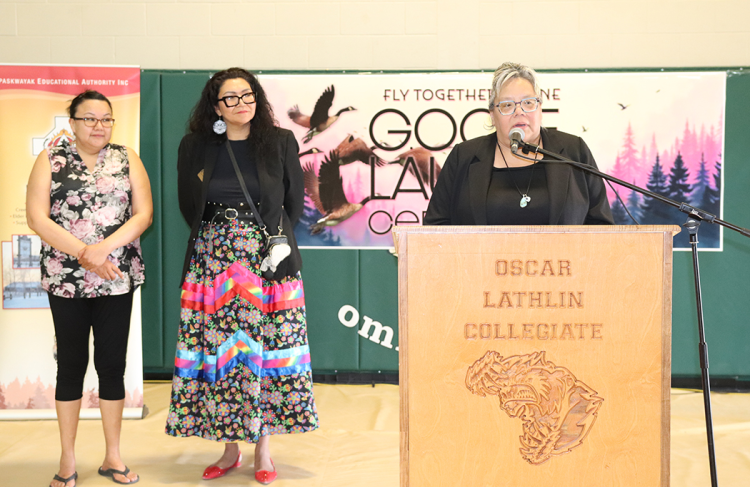Nearly 200 people turned out to Oscar Lathlin Collegiate in Opaskwayak Cree Nation (OCN) on May 26 for the launch of a new initiative between the College of Rehabilitation Sciences and nine First Nations communities in Manitoba, supported by the University of Manitoba's innovative partnership with the Mastercard Foundation.
The initiative, Grown Our Own Specialists through Education (GOOSE), aims to address the shortage of rehabilitation health-care professionals in Manitoba's north, as well as the overall underrepresentation of Indigenous people in the profession.

St. Theresa Point educator Stephanie Wood speaks at the GOOSE launch ceremony, along with Tricia Manoakeesick (L) and Margaret Hart.
The project recently received $1.5 million in funding from UM through its $16.1-million partnership with the Mastercard Foundation's EleV Program, which is partnering with UM and First Nations, Métis, and Inuit youth in Canada to increase Indigenous student success and lead systemic change.
GOOSE promotes careers in rehabilitation sciences to students starting in Grade 7, ensuring that Indigenous youth are well-prepared for their educational journeys toward careers in occupational therapy, physical therapy, respiratory therapy and speech language pathology.
Delegates from several of the partner communities were in attendance, along with educators, UM representatives and high school students from Oscar Lathlin Collegiate.
Marlene Head, post-secondary supervisor at OCN, was one of the initial visionaries of the program, along with Bev Fontaine, director of education at OCN, and Jen Bercier, principal at Oscar Lathlin Collegiate.
Head said the gap between rising need and lack of appropriate services drove the vision of the program.
"The number of children with exceptionalities are rising. We cannot continually wait our turn for itinerant services to assess and service our children."
Fontaine spoke about the history of the initiative, which began in early 2020. She acknowledged Dr. Reg Urbanowski, dean of the College of Rehabilitation Sciences at the Rady Faculty of Health Sciences, for helping develop the program.
She also welcomed representatives of the other First Nations that are part of the initiative: Berens River, Black River, Fisher River, Mathias Colomb (Pukatawagan), Norway House, Pimicikamak (Cross Lake), Sagkeeng and St. Theresa Point.
"GOOSE was based on the fact there is this huge need to educate our young people in these specialized careers," Fontaine said. "I wish all the First Nations all the best as they move forward to educate our young people on the importance of rehab sciences and the careers that can be had."
Margaret Hart, Indigenous scholar (Ininiw) in the College of Rehabilitation Sciences and UM's community facilitator for the initiative, spoke on behalf of the college and addressed the youth in attendance.
"Your presence in the health sciences is very important. We experience a lot of racism in these systems, so we need to start educating our youth to help our communities," Hart said. "Part of this very important initiative is to not forget the Indigenous knowledge systems that we bring forth as part of this work."
Hart was joined by two community members from the St. Theresa Point Anisiniw Education Authority, Stephanie Wood and Tricia Manoakeesick, with a call to action for the federal government to fund essential rehabilitation services.
"Currently there is no funding for occupational therapists, physiotherapists and respiratory therapists in many of our communities. How can we truly heal our people without access to these critical services?" Hart said.
Wood and Manoakeesick also spoke about the importance for youth to remember Indigenous ways of knowing and being.
"I want to make sure we have an Indigenous approach to our sciences in the health field, so we can use our knowledge of natural medicine and natural ways of caring for each other," Wood said.
In her own Ansineemowin language, Manoakeesick said the only way to revitalize Indigenous ways is through advocating youth to keep the language alive.
The event concluded with performances by student dancers and drummers.












